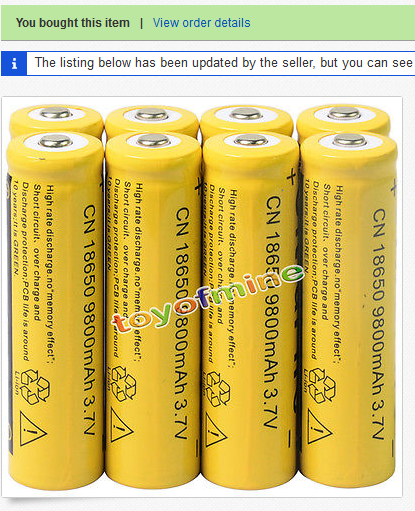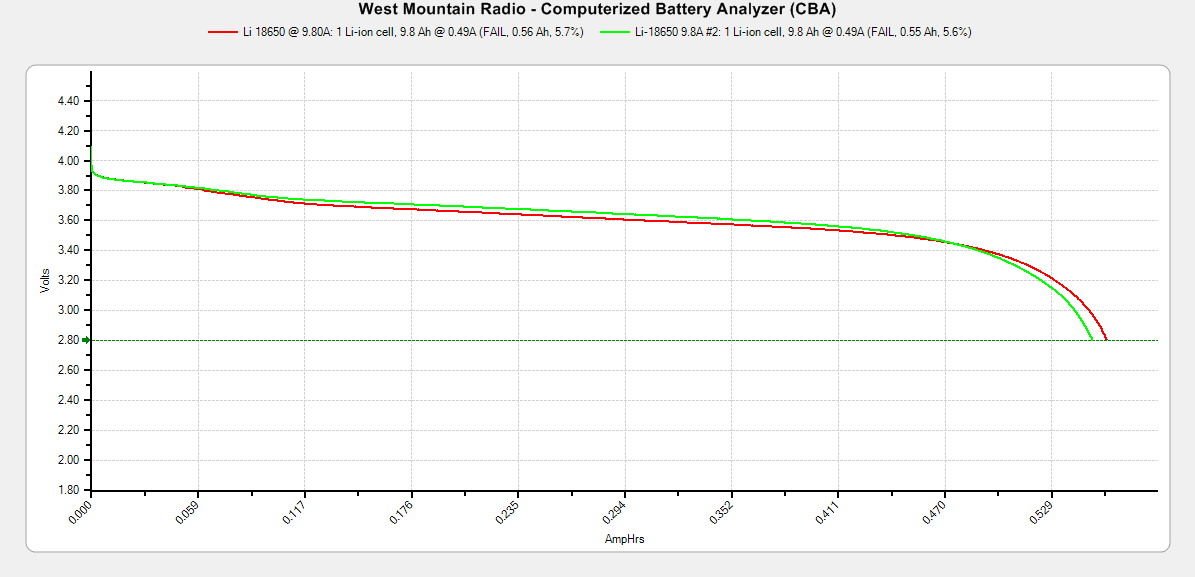Lithium Batteries are NOT all Created Equal!
by Phil Karras 01/25/2018 * Last Update:
I'm sure this is not just a Lithium (Li) battery issue but I hit this wall
during the Holiday season while buying flashlights and Li batteries for family
members.
I was buying standard 3000 mAh Li batteries type 18650 and then saw batteries
claiming to be 9800 mAh. Now, 9800 mAh (9.8 Ah) seemed fantastic to me and the
price was unbelievable.
Well, you know what they say about something being too good to be true, right?
It was!
Here's the ebay picture of these batteries:

Image 1: 8X UtraFire 9800 mAh 18650 batteries
The present listing says shipping is free but I paid $3 when I bought them for
a total of $16.33 so about $2.04 each.
I did not think that 9800 mAh was far and above any other real 18650 battery
energy density nor did I think about how inexpensive they were compared to
quality 18650 batteries. Both failures on my part.
But, once they arrived and I took them out, the first indication that these
could not be what they claimed to be was the simple fact that they weighed
much less than a number of other good quality 18650 batteries from
other, reputable manufacturers. These batteries weighed in at about 25 grams
while other good-quality batteries weighed 43 or more grams.
I decided to test half of these batteries to see what they were really able to
produce as far as mAh is concerned.
In qualifying a battery the test is run at 1/20th of the claimed rating. This
means that for a 9800 mAh battery, the test current is 490 mAh and the test
should run for 20 hours before the battery reaches the cut-off voltage. For A
Li 3.7 V battery, the cut-off is ~ 2.8 - 3 Volts. I've learned that a Li
battery can go down to 2.6 Volts without damage. I tested these UltraFire
batteries to 2.8 Volts and then I tested batteries I thought were good quality
and only tested these down to 3.0 Volts.

Image 2: UltraFire Battery Test Batteries #1 & #2
Now, to compare these cells to 3000mAh cells which test better than 95% of 3000mAh,
click Here.
The curves for the two batteries tested shows that the best, battery #2,
delivered 560 mAh This is only around 5.7% of the claimed 9800 mAh. Batteries
#3 and #4 were almost identical, with ratings of 550 and 560 mAh. So, all four
batteries tested were no better than 5.7% of the claimed rating.
This was at the very least false advertising, so I contacted the seller and in
less than a week I had all of my money back.
There are numerous Chinese sellers selling these and similar batteries under
the names of UltraFire, BXE, & GTF, to name a few, which I was able to find on
eBay. These are just the ones claiming 9800 mAh. There are others claiming
5800, or 6000mAh as well which I suspect are not what they claim to be either.
So, how can one figure out a potential problem quickly?
In the case of these batteries it turned out to be rather simple. Simply
contact the seller and ask how much one of the Li batteries weigh in grams. If
the number is less than 40 grams and they claim anything more than around 3000
mAh then it is false. A true 3400mAH 18650 battery from Panasonic weighs about
56g without a protection circuit.
I do not blame the sellers since I am very sure that they do not know that
these batteries are not what the manufacturer claims them to be. In email
conversations I've had with some of them, they have no idea what I'm talking
about when I ask if they have tested the batteries. So I am convinced that
they have neither a way to test them or anyone on staff capable of testing the
batteries.
So once again, if it seems to good to be true, it probably is. If in doubt
simply ask the seller how much a single battery weighs. If a higher than 3000
mAh 18650 Li battery weighs less than 43g, then don't buy it.
This is simple chemistry. If a 3000 mAh battery weighs 43g, then a 6000 mAh
battery of the same chemistry should weigh about 73g. The case won't weigh any
more or less, so if we assume ~13g for the case, then our 3000 mAh battery has
Li chemistry of 30g for the 3000 mAh. This then means that a 6000 mAh battery
of the same chemistry should be around 73g. The rule of thumb seems to be ~10g
per 1000 mAh. Using this rule of thumb for a known true 3400mAh 18650 battery,
the NCR18650, we get 13+34 ~ 47g, its actual weight was 45.9g. The rule of
thumb seems to hold here as well.
This means they would have to fit three times the amount of Li chemistry into
the same form factor to be an 18650 battery of 9800 mAh and it should then
weigh ~ 13g case + 98g Li-Chem ~ 111g.
My assumption here is that they have not come up with a new lighter Li battery
chemistry. I feel very confident that if anyone invents a new chemistry that
is a third or fourth the weight of the present Li chemistry, we'd be hearing
about it on the news and in the scientific/engineering journals.
In conclusion, at least where the new influx of Li 18650 batteries is
concerned, buyer beware! Check the weight before your buy.
After writing this I was doing a little more web research and found another
tester, Richard Lloyd, who did similar tests to mine more than a year ago
and came to the same conclusions I did. His youtube video shows the weights,
mAh claims and he even cuts open one of these very light weight 18650 batteries
to show how empty is it. This video is a bit long but very informative.
You can see it at:
Testing 9800mAh Li 18650 Battery by Richard Lloyd
I decided to also cut open one of these batteries so you can see it here.

First the case showing the claims
And now the case opened:

And last, a better view through the battery chemistry:

I trust everyone noticed that there was nothing inside the battery other than
a little chemistry, no protective circuitry.
Want to read more? Try these related articles:
Bogus Li 18650 Batteries
- My attempt at finding a way to easily pick out the bogus batteries being
offered on eBay,
Amazon, and who knows where else, and
Beyond the Simple Joule Thief - This describes my use of some bogus
9800mAh batteries in something useful.
 Return to:
previous page
[Close Me]
Return to:
previous page
[Close Me]


 Return to:
previous page
[Close Me]
Return to:
previous page
[Close Me]